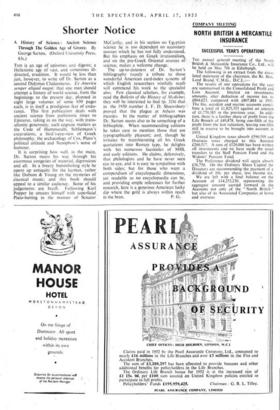Shorter Notice
Thus is an age of epitomes and digests; a Hellenistic age of vast, and sometimes ill- directed, erudition. It would be less than just, however, to write off Dr. Sarton as a second Didymus Chalcenterus. Ex America semper aliquid magni: that one man should attempt a history of world science, from the beginnings to the present day, planned in eight large volumes of some 650 pages each, is in itself a prodigious feat of endu- rance. This first publication deals with ancient science from prehistoric times to Epicurus, taking in on the way, with trans- atlantic generosity, such cognate matters as the Code of Hammurabi, Schliemann's excavations, a bird's-eye-view of Greek philosophy, the archaeology of Cos, Plato's political attitude and Xenophon's sense of humour.
It is surprising how well, in the main, Dr. Sarton steers his way through his enormous congeries of material, digressions and all. In a breezy buttonholing style he opens up antiquity for the layman, rather like Dobson & Young on the mysteries of classical music; and this book should— appeal to a similar audience. Some of his judgements are brash. Following Karl Popper he amuses himself with superficial_ Plato-baiting in the manner of Senator McCarthy, and in his section on 'Egyptian science he is too dependent on secondary sources which he has not fully understood. But his emphasis on Greek irrationalisnk and on the pre-Greek Oriental sources of science, makes a welcome change.
The up-to-dateness of Dr. Sarton's bibliography (surely a tribute to those wonderful American card-index systems of which English researchers wistfully read) will commend his work to the specialist also. Few classical scholars, for example, read the Bulletin of the History of Medicine; they will be interested to find (p. 324) that:. in the 1950 number J. F. D. Shrewsburi:4:. proved that the plague at Athens was measles. In the matter of bibliographies Dr. Sarton seems also to be something of a bibliophile. When recommending editions he takes care to mention. those that are typographically pleasant; and, though he irritates by transliterating all his Greek quotations into Roman type, he delights with his numerous facsimiles of MSS. and early editions. He claims, defensively, that philologists and he have never seen eye to eye, and it is easy to sympathise with both sides; but for those who want a compendium of encyclopaedic dimensions, yet readable as no encyclopaedia can be, and providing ample references for further research, here is a generous American lucky dip where the gold is always within reach


































 Previous page
Previous page